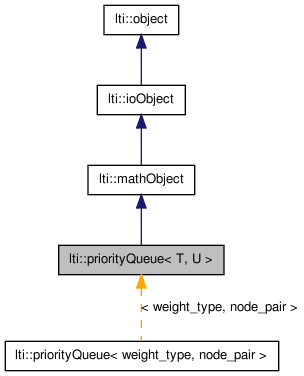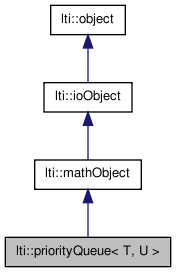

|
latest version v1.9 - last update 10 Apr 2010 |
|
Simple priority queue data class. More...
#include <ltiPriorityQueue.h>


Public Types | |
| typedef int | index_type |
Public Member Functions | |
| priorityQueue (const T &inv) | |
| priorityQueue (const priorityQueue< T, U > &other) | |
| virtual | ~priorityQueue () |
| index_type | insert (const T &key, const U &data) |
| void | erase (const index_type id) |
| void | update (const index_type id, const T &newKey) |
| void | update (const index_type id, const T &newKey, const U &data) |
| bool | valid (const index_type id) const |
| const T & | getKey (const index_type id) const |
| const U & | getData (const index_type id) const |
| bool | setData (const index_type id, const U &newData) |
| bool | empty () const |
| void | create (const std::vector< T > &key, const std::vector< U > &data) |
| void | create (const std::vector< std::pair< T, U > > &data) |
| const std::pair< T, U > & | front () const |
| void | getData (std::vector< std::pair< T, U > > &d) const |
| void | pop () |
| void | clear () |
| priorityQueue< T, U > & | copy (const priorityQueue< T, U > &other) |
| priorityQueue< T, U > & | operator= (const priorityQueue< T, U > &other) |
| virtual mathObject * | clone () const |
| const char * | getTypeName () const |
| virtual bool | write (ioHandler &handler, const bool complete=true) const |
| virtual bool | read (ioHandler &handler, const bool complete=true) |
| virtual bool | writeAll (ioHandler &handler, const bool complete=true) const |
| virtual bool | readAll (ioHandler &handler, const bool complete=true) |
Protected Member Functions | |
| bool | checkConsistency () const |
Protected Attributes | |
| T | invalid |
| std::vector< std::pair< T, U > > | data |
| int | numElements |
| int | stackPtr |
| int | numRemoved |
| std::vector< int > | idToIndex |
| std::vector< int > | indexToId |
Simple priority queue data class.
The main difference with the std::priority_queue is that when you insert an element in the queue, you get an identification token (positive integer value), that will uniquely identify the element in the queue as long as the element exists. This is used to access the specific element independently of its position in the queue, allowing to change its key or data, changing its positions, but still keeping a valid reference to it.
The queue is always sorted in increasing order of the key. This means that the smallest key is always on the top of the queue.
Removing elements of the queue (pop() or erase()) are O(1) operations. Inserting an elements is a O(n) operation. Therefore, a specialized method to create the queue at once (create()) is provided, which will build the queue in O(n*log(n)), instead of the O(n^2) required inserting the elements one by one.
The type T is the type for the key. The queue is sorted with respect to this key.
The type U is the type of the data contained in each element.
| typedef int lti::priorityQueue< T, U >::index_type |
index type used to reference elements in the queue
| lti::priorityQueue< T, U >::priorityQueue | ( | const T & | inv | ) |
constructor
| inv | key used to indicate an invalid queue entry. Entries are for example invalid, if they were removed or "poped" from the queue. |
| lti::priorityQueue< T, U >::priorityQueue | ( | const priorityQueue< T, U > & | other | ) |
copy constructor
| virtual lti::priorityQueue< T, U >::~priorityQueue | ( | ) | [virtual] |
destructor
| bool lti::priorityQueue< T, U >::checkConsistency | ( | ) | const [protected] |
debugging method to check the consistency of the priority queue
| void lti::priorityQueue< T, U >::clear | ( | ) |
remove all elements from the priority queue
| virtual mathObject* lti::priorityQueue< T, U >::clone | ( | ) | const [virtual] |
returns a copy of this object
Implements lti::mathObject.
| priorityQueue<T,U>& lti::priorityQueue< T, U >::copy | ( | const priorityQueue< T, U > & | other | ) |
copy the priority queue
| other | the priority queue to be copied. |
Reimplemented from lti::ioObject.
| void lti::priorityQueue< T, U >::create | ( | const std::vector< std::pair< T, U > > & | data | ) |
create the queue using the given data.
The ids will be the original element index
| void lti::priorityQueue< T, U >::create | ( | const std::vector< T > & | key, | |
| const std::vector< U > & | data | |||
| ) |
create the queue using the given data.
The ids will be the original element index
| bool lti::priorityQueue< T, U >::empty | ( | ) | const |
return true if the queue is empty
| void lti::priorityQueue< T, U >::erase | ( | const index_type | id | ) |
remove the node with the given id
| const std::pair<T,U>& lti::priorityQueue< T, U >::front | ( | ) | const |
return reference to element at the front
| void lti::priorityQueue< T, U >::getData | ( | std::vector< std::pair< T, U > > & | d | ) | const |
copy all data in the priority queue into the given std::vector.
| const U& lti::priorityQueue< T, U >::getData | ( | const index_type | id | ) | const |
Get the data for the given index id.
You must ensure first that the id is valid
| const T& lti::priorityQueue< T, U >::getKey | ( | const index_type | id | ) | const |
Get the key for the given index id.
You must ensure first that the id is valid
| const char* lti::priorityQueue< T, U >::getTypeName | ( | ) | const [virtual] |
returns name of this type
Reimplemented from lti::mathObject.
| index_type lti::priorityQueue< T, U >::insert | ( | const T & | key, | |
| const U & | data | |||
| ) |
insert a new node with the given key and data and return a pointer to the created node
| key | key of the element | |
| data | data of the element |
| priorityQueue<T,U>& lti::priorityQueue< T, U >::operator= | ( | const priorityQueue< T, U > & | other | ) |
copy the priority queue
| other | the priority queue to be copied. |
Reimplemented from lti::ioObject.
| void lti::priorityQueue< T, U >::pop | ( | ) |
remove the first element of the queue
| virtual bool lti::priorityQueue< T, U >::read | ( | ioHandler & | handler, | |
| const bool | complete = true | |||
| ) | [virtual] |
read the priority queue
Reimplemented from lti::mathObject.
| virtual bool lti::priorityQueue< T, U >::readAll | ( | ioHandler & | handler, | |
| const bool | complete = true | |||
| ) | [virtual] |
read the output of the writeAll method.
| bool lti::priorityQueue< T, U >::setData | ( | const index_type | id, | |
| const U & | newData | |||
| ) |
Change the data content of an element indexed by the given id.
You must first ensure that the id is valid.
| id | identification key for the element to be modified. | |
| newData | new data to be written in the element |
| void lti::priorityQueue< T, U >::update | ( | const index_type | id, | |
| const T & | newKey, | |||
| const U & | data | |||
| ) |
update the key of an element without changing its id
| void lti::priorityQueue< T, U >::update | ( | const index_type | id, | |
| const T & | newKey | |||
| ) |
update the key of an element without changing its id
| bool lti::priorityQueue< T, U >::valid | ( | const index_type | id | ) | const |
Check if the given id is valid.
| virtual bool lti::priorityQueue< T, U >::write | ( | ioHandler & | handler, | |
| const bool | complete = true | |||
| ) | const [virtual] |
write the priority queue
Reimplemented from lti::mathObject.
| virtual bool lti::priorityQueue< T, U >::writeAll | ( | ioHandler & | handler, | |
| const bool | complete = true | |||
| ) | const [virtual] |
write all attributes of the class
To serialize a priority queue, not all data is necessary, but for debugging purposes you might want to have all internals written. This method writes everything.
std::vector< std::pair<T,U> > lti::priorityQueue< T, U >::data [protected] |
the real data.
Some of its elements can be removed, so the real number of elements is NOT data.size() but numElements. The data here is sorted. Because the indices of the elements will change each time an element is inserted/removed, an equivalences vector will keep track of the element movements.
std::vector<int> lti::priorityQueue< T, U >::idToIndex [protected] |
get the real element position in the data vector given the original index.
std::vector<int> lti::priorityQueue< T, U >::indexToId [protected] |
get the real element position in the data vector given the original index.
T lti::priorityQueue< T, U >::invalid [protected] |
code used to indicate a removed element'
int lti::priorityQueue< T, U >::numElements [protected] |
number of elements in data
int lti::priorityQueue< T, U >::numRemoved [protected] |
number of elements removed until now
int lti::priorityQueue< T, U >::stackPtr [protected] |
top of the stack.
This pointer MUST always point to the first valid element!